 Petzlover
Petzlover Maltipoo is originated from United States but Mucuchies is originated from Venezuela. Maltipoo may grow 36 cm / 14 inches shorter than Mucuchies. Maltipoo may weigh 55 kg / 121 pounds lesser than Mucuchies. Maltipoo may live 3 years more than Mucuchies. Maltipoo may have less litter size than Mucuchies. Maltipoo requires Moderate Maintenance. But Mucuchies requires Low Maintenance
Maltipoo is originated from United States but Mucuchies is originated from Venezuela. Maltipoo may grow 36 cm / 14 inches shorter than Mucuchies. Maltipoo may weigh 55 kg / 121 pounds lesser than Mucuchies. Maltipoo may live 3 years more than Mucuchies. Maltipoo may have less litter size than Mucuchies. Maltipoo requires Moderate Maintenance. But Mucuchies requires Low Maintenance
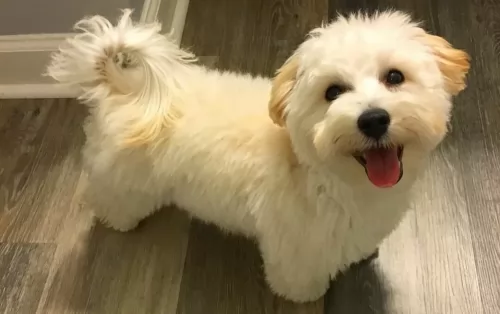 The Maltipoo is a popular dog breed – a cross between the Maltese and Poodle. The dog originates in the United States.
The Maltipoo is a popular dog breed – a cross between the Maltese and Poodle. The dog originates in the United States.
The Maltipoo is a cross breed but it is often referred to as a designer dog because of it being purposely bred. The cute little dog has been created to be a companion dog, suiting allergy sufferers because of him being a low shedder and considered hypoallergenic.
The Maltipoo isn’t officially recognized as a true breed. Some Maltipoo Clubs and Registries have been formed.
 The Mucuchies are a breed born in the Venezuelan mountains, in the late 1700s. They are rare today but were popular in the mountains for hundreds of years. They are believed to be a cross between the dogs brought by the Spanish Conquistadors in the 14th and 15th centuries and the local dogs. However, by the 1960s this rare breed was close to extinction.
The Mucuchies are a breed born in the Venezuelan mountains, in the late 1700s. They are rare today but were popular in the mountains for hundreds of years. They are believed to be a cross between the dogs brought by the Spanish Conquistadors in the 14th and 15th centuries and the local dogs. However, by the 1960s this rare breed was close to extinction.
Bred primarily as herders and watchdogs, their ancestry likely included the Algerian Mastiff, the Spanish Mastiff, the Great Pyrenees, and the Atlas Shepherd, otherwise known as the Aidi. The early development of the Mucuchies is attributed to Wilender Ferrari, DVM. At the time, Simon Boliva was fighting for Venezuelan independence in the city of Mucuchies. He adopted a member of the breed and named it for the city. The name stuck as the name for the breed.
Later in this timeframe, the Mucuchies was crossbred with the Pyrenean Mastiffs that friars brought to the Andes from their monasteries. With them, they also brought the sheep for the dogs to herd and guard. During the 1920s the breed spread throughout the country, but by the beginning of the 1960s there was a major decline in the breed. This was partly due to changes in culture and lifestyle in the Andes.
In 1961 a Mucuchies club was formed for the breed preservation and the breed was formally named the National Dog of Venezuela. The club was disbanded in the mid-1960’s and this led the breed to the edge of extinction. By 2008 there was another major push to save the breed. This effort came from the government who wanted to preserve the breed. In 2008, they created the Fundacion Nevado and sent six Mucuchies to the Waraira Repano Cable Car System in the El Avila National Park so that the dogs would be in a climatic environment as similar to the Andes mountain as possible. This was successful and the program was increased by Venezuelan President Hugo Chavez.
As the breed continued to develop the shepherding instincts were lost and the guarding aspects were strengthened. This left today’s Mucuchies as a breed of gentle, active dogs with strong characters and a loving disposition. They are gentle with their families but protective and aggressive with strangers. They are the only native breed of Venezuela and currently, there are programs in the mountains to re-establish and strengthen them.
In addition to their name for the town of Mucuchie, the breed is also called the Paramo’s Dog or the Snowy. These programs exist because in Venezuela they are near extinction once again. This is the result of inbreeding and more cross-breeding, this time with larger dogs like St. Bernards. Thus, the continued efforts by the Nevado Foundation with the assistance of the government to restore the original Mucuchies breed to Venezuela.
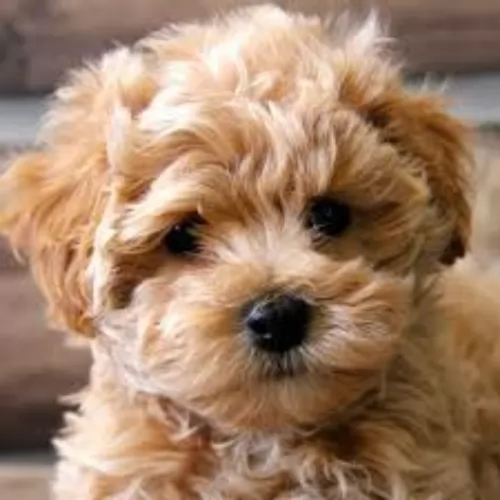 The small Maltipoo stands at between 20 and 35cm and weighs about 2 to 6kg. There is no breed standard for this dog. The coat is fluffy and is more inclined to be wavy than curly. It can become quite long and most people prefer to have him professionally clipped.
The small Maltipoo stands at between 20 and 35cm and weighs about 2 to 6kg. There is no breed standard for this dog. The coat is fluffy and is more inclined to be wavy than curly. It can become quite long and most people prefer to have him professionally clipped.
Coat colors vary from white to cream, apricot and brown or it can be a combination of these colors. He has a tail which some people prefer to dock, but if not, the tail is long and curls, sometimes over the back.
Owning a Maltipoo, you’ll quickly discover that this little dog is active, feisty, bright and, fun-loving, and your life is pretty much not going to have a dull moment with him in it.
If you’re a first time dog owner you’ll love the Maltipoo as he is pretty much easy going. He makes an excellent family pet as he is even tempered. Make sure your kids have been taught how to treat him – with respect, gentleness and kindness. Never allow toddlers to climb over any dog – big or small.
The Maltipoo is intelligent too and this means training and socialization will be easy for him. Many people use them as therapy dogs and they definitely seem to have an affinity with older people, bringing joy into their lives with their bright nature.
They are dogs that can adapt to life in the city or the countryside, just so long as they are with their beloved human family. They’re essentially indoor dogs but will gladly venture outdoors if it means ball games on the lawn with the children or a walk outside the confines of his home. This gives him the opportunity to smell new aromas, a physically and mentally stimulating game for him.
 The appearance of the Mucuchies is that of a breed of large dogs who stand two feet at the shoulder and can weight one hundred pounds. They have a deep chest, heads that are wedge-shaped and skulls shaped like domes. Their muzzles are straight, and their nostrils are large on their black nose. The Mucuchies have dark eye and eyelids along with ears that are triangular in shape and medium in size. Their lips are black but this and he has a well-developed ruff.
The appearance of the Mucuchies is that of a breed of large dogs who stand two feet at the shoulder and can weight one hundred pounds. They have a deep chest, heads that are wedge-shaped and skulls shaped like domes. Their muzzles are straight, and their nostrils are large on their black nose. The Mucuchies have dark eye and eyelids along with ears that are triangular in shape and medium in size. Their lips are black but this and he has a well-developed ruff.
They are large, sturdy dogs with a grand appearance and tremendous energy. Their neck is strong, short and very muscular with wide shoulders and a straight back. The tail is much longer than their hocks and it is shaped like a fan and he raises it when he is alerted. They have a short, thick coat and most are white or white with gray, honey or black. This is a very attractive breed.
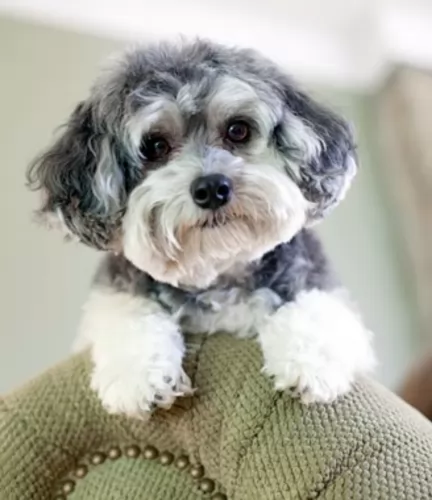 Your Maltipoo is guaranteed to bring much joy into your home. He is a social dog, loving to spend time with his human family, whether indoors our outdoors. He is an active dog so will look forward to his walk every day.
Your Maltipoo is guaranteed to bring much joy into your home. He is a social dog, loving to spend time with his human family, whether indoors our outdoors. He is an active dog so will look forward to his walk every day.
Treat your little pet with love and good care, after all he has got so much companionship to offer and deserves the best there is to that the 12 to 15 years he has are filled with health and happiness.
 Good with children and very good with their own families. Might be a little standoffish with others.
Good with children and very good with their own families. Might be a little standoffish with others.
They no longer have the strong herding instinct but are outstanding guard dogs.
Yes but need land to run in. Don’t put this giant dog in an apartment. You will both be miserable.
Very intelligent and their ability and willingness to learn is very good.
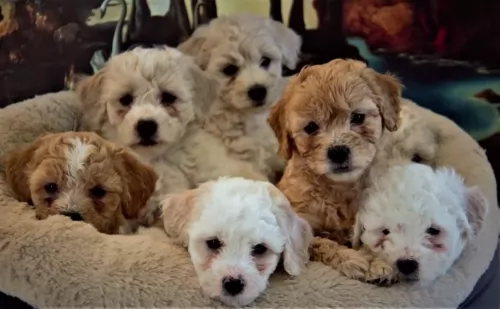 The Maltipoo is such a bright little dog, brimming with energy, but even so, he can get sick, just like with any other dog.
The Maltipoo is such a bright little dog, brimming with energy, but even so, he can get sick, just like with any other dog.
Small dogs are prone to dental problems and gum disease and tartar build up can cause many problems and tooth loss. Any dental infections can lead to infections which can put the entire body in jeopardy.
This is a degenerative eye disorder that can cause blindness and although there is no cure there are things that the vet can do for your pet.
 Because of their rarity and somewhat isolation, they do not have many genetic health concerns. They do however face at least a couple of the issues that most large dogs face.
Because of their rarity and somewhat isolation, they do not have many genetic health concerns. They do however face at least a couple of the issues that most large dogs face.
This can be a serious issue for such a large dog. It can cause arthritis and lameness.
This might be the biggest threat to the Mucuchies’ health. They are big dogs and if they injury limbs it can be quite serious.
The distension or inversion of the stomach and intestines is potentially fatal and must be treated immediately. Large dogs are prone to bloat and feeding schedules can go a long way in preventing it.
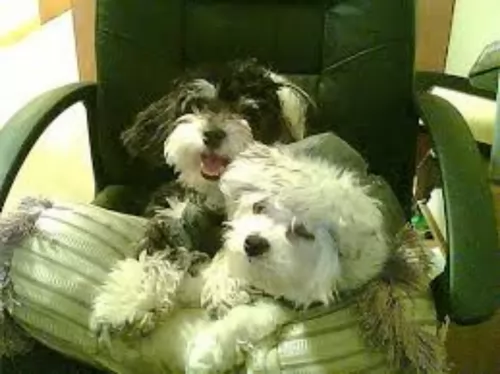 The Maltipoo is such a sweet little dog – you want to be sure that you look after him as well as can be.
The Maltipoo is such a sweet little dog – you want to be sure that you look after him as well as can be.
Always take your pet for regular veterinary check-ups if you suspect he is ill. If you get a Maltipoo puppy you will need to take him to the vet because there are a number of vaccines he will need to prevent him from picking up some life threatening canine diseases. Some of these are parvo and rabies among others.
Also, as your Maltipoo reaches adulthood you will need to decide whether you will have the dog spayed or neutered to prevent puppies.
Groom your Maltipoo to keep the coat in tip top condition. Brush him at least twice a week to keep him free of loose hairs. It’s a nice bonding session for your pet too and it gives you the chance to check for fleas and ticks. Most Maltipoo owners take their pets to professional groomers to have the coat trimmed as then he looks and feels more comfortable in warmer weather.
Be careful about bathing him too often as even the mildest shampoos can irritate his skin and it strips the coat of natural oils. Other grooming needs will require you keeping his nails short and cleaning his teeth at least 2 or 3 times a week. Because he has floppy ears, check inside them as they can collect excess wax and debris.
If you are unsure about these kinds of grooming needs, check with your vet or groomer because doing it wrong could cause injury to your pet.
Give your pet a soft, warm, dry bed to sleep in. You can make a soft ‘nest’ on the floor or you can buy a sleeping platform or traditional dog basket.
With a Maltipoo, choose a high-quality small breed dog food if you are going to feed him commercially manufactured food. This is to ensure he remains healthy. Try and keep your diet simple for your Maltipoo to avoid stomach problems.
For variety, add in some chopped boiled chicken, brown rice and vegetables to his dry kibble. The amount of food you give him will depend on his size and activity levels but you want to avoid feeding him too much so that it leads to obesity. Obesity can bring on a host of dog illnesses.
As opposed to one larger bowl of food, rather feed him two smaller meals which is far healthier for him. Remember to always have a bowl of fresh, cool water standing close by.
 As mentioned in health concerns, feeding appropriately is critical to the Mucuchies’ health. Puppies need a high quality, large breed dry food 2-3 times per day at ½ cup each time. Don’t overfeed. Don’t exercise before or after eating to prevent bloat.
As mentioned in health concerns, feeding appropriately is critical to the Mucuchies’ health. Puppies need a high quality, large breed dry food 2-3 times per day at ½ cup each time. Don’t overfeed. Don’t exercise before or after eating to prevent bloat.
The adult Mucuchies should eat at least twice a day for a total of two and one-half cups. So, you might feed one and ¼ cup at each meal. Again, it is critically important that you don’t overfeed. Don’t feed before or after strenuous exercise and don’t let your Mucuchies eat too quickly in order to avoid bloat.
This is a large dog with generally very good health. His stamina and heart will impress you.
The Mucuchies is not an active inside dog, but he is a large dog that needs daily exercise. They need to be able to run or at least to trot. A large yard or dog bark is necessary. However, this big, double coated dog hates the hot weather and needs a cooler climate. Winter is fine with him. Don’t overwork them while they are growing. Walks are the best exercise for this breed.